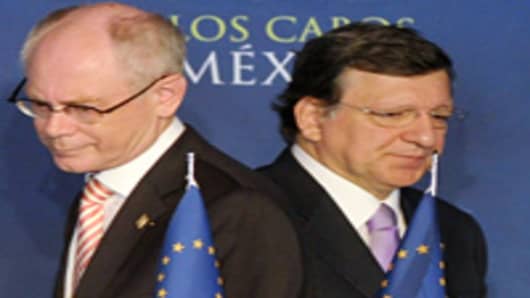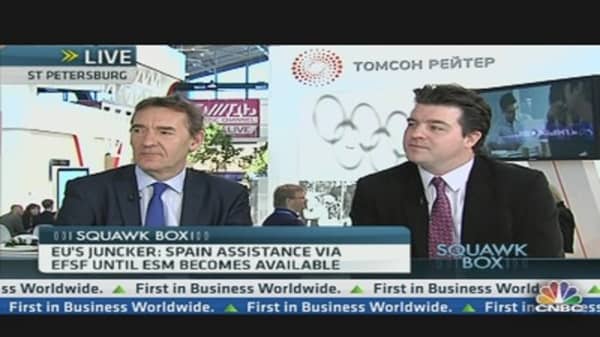Western policymakers are "making fools" of themselves in the eyes of people in emerging markets as no initiative to end the euro zone crisis has emerged in more than two years, an economist told CNBC at the St. Petersburg International Economic Forum(SPIEF).
Pressure on European leaders to find a solution to the crisis has been increasing, with G20 leaders calling for more action earlier this week and Russian President Vladimir Putinusing a speech at the SPIEF to highlight the difference between low-debt and high-growth in Russia and debt-ridden countries in crisis.
"The banks are propping up the government, the government is propping up the banks. I live in Russia right now and we're making complete fools of ourselves in the West," Liam Halligan, chief economist at Prosperity Capital Management told CNBC.
David Soanes, head of global capital markets at UBS, told CNBC that Europe was facing a deficit of bank capital coupled with a "deficit of political capital."
During a CNBC debate on banking on Thursday, Citigroup CEO Vikram Pandit warned that unless a sweeping solution was found soon, the crisis of confidence that has already sent Spanish bond yields into danger territorywill deepen.
"Our fear is that the markets move faster than policymakers," Pandit said.
IMF Managing Director Christine Lagardeon Thursday called on the European Central Bank to cut interest rates and said giving aid directly to struggling banks in the euro zone rather than to governments would be a better way of dealing with the debt crisis.
"Talk about closing the stable door when the horses have bolted," Halligan said, noting that this solution had long been advocated by various analysts and market participants.
Will Euro Zone Collapse?
European Union finance ministers meet in Luxembourg on Friday to discuss creating a banking union, a crucial step towards closer integration in the euro zone and eventually fiscal union—which some analysts have said is the missing element that makes the single European currency unsuccessful.
"Fiscal unionis an intellectual fig leaf for money printing ," said Halligan, in whose opinion the euro zone should scale down in order to survive.
"If life would be so simple," Jim O'Neill, chairman at Goldman Sachs Asset Management and the man who coined the term "BRIC" for the fast-growing emerging markets of Brazil, Russia, India and China, said in response.
O'Neill pointed out that a smaller euro zone, with members who have lower debt and are able to implement fiscal discipline, is probably "what the Germans want" but "political reality gets in the way."
Frustration, if Greece fails to meet even a reworked bailout, may become so deep that the country may be forced to drop out of the euro , Willem Buiter, chief economist at Citigroup, wrote in an opinion in the Financial Times.
"There is now a material risk, if procrastination and policy paralysis prevail, that the endgame for the euro could be an onion-like unpeeling and unraveling," Buiter wrote.
"Survival to fight another crisis will require at least the following: an enhanced sovereign liquidity facility, banking union and sovereign debt and bank debt restructuring, with only limited sovereign debt mutualization," he added.
O'Neill pointed out that 10 years ago it was Germany that was recording sluggish growth and was lagging behind other euro zone peers.
"You have to stand back and take a bit of perspective," he told CNBC. "It's so fashionable to regard Germany as a competitive player; 10 years ago when it all started the phrase 'euro sclerotic' originated from Germany."
The situation in the euro zone is not very different from that of other developed countries in the world, according to O'Neill.
"Banks buying government bonds are part of the monetary system. It happens in the UK, in the U.S., in Japan… it's nothing particularly special," he said.
O'Neill said that talking with people who attended the G20 meeting in Mexico seemed to show they had a belief that "something is in the works."
"Somewhere along the line here one of the bazookas is going to come out," he said.




